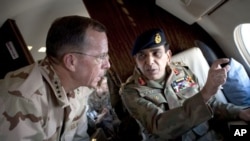Following the leak of tens of thousands of documents on the war in Afghanistan, analysts in the region are debating whether the U.S.-Pakistani relationship will suffer a setback. They say the concern comes from the documents that allegedly show U.S. military members suspected Pakistan's spy service of supporting the insurgency.
The severity of the impact by the leaked war documents on the U.S.-Pakistani relationship depends on who you ask on either side of the Durrand Line, a border shared by Pakistan and Afghanistan.
More than 180 documents, a relative handful of the tens of thousands released, describe alleged U.S. military concerns that Pakistan's military spy agency, the Inter-Services Intelligence, has provided support and guidance to elements of the Afghan Taliban.
Is Pakistan the enemy?
While this information, supposedly from 2004 to 2009, has not been confirmed, analyst Abdul Wahid Taqat said he believes the United States should consider Pakistan its main enemy and depend on Afghanistan in the region.
Taqat was a general in the Afghan army during the 1980s and 1990s. At that time, the ISI supplied both domestic and U.S. assistance to some of these insurgents who were then fighting the Soviets in Afghanistan.
He said America's insistence on partnering with Pakistan is useless, and recommends the United States abandon Pakistan and start depending more on Afghanistan. The Obama administration should approach the region from an Afghan perspective, said Taqat.
CIA well informed
But retired Pakistani Brigadier-General Mahmood Shah disagrees. Shah is the former security chief for Pakistan's tribal areas, where many regional experts believe Afghan Taliban elements are hiding.
While some critics might use these documents to put pressure on Pakistan, he said he thinks the CIA is too well informed in the region to believe Pakistan is helping to kill Americans in Afghanistan.
"The government of Pakistan has no reason to punish the Americans for anything. They have been helpful. They will be helpful in the future also. At the government level, I am sure they will try to help the U.S. government for an honorable withdrawal [from Afghanistan]," Shah said.
He said that while Pakistan fights its own war against domestic Taliban elements, Islamabad has helped U.S. authorities arrest Afghan Taliban leaders in Pakistan and even offered its assistance in negotiating a peace deal between the Taliban and Afghan government.
Pro-Pakistan government
Afghan political analyst Akmal Dawi said it is this possibility of a pro-Pakistan government in Kabul that is Islamabad's ultimate goal, even if it costs Afghan civilians' and coalition troops' lives.
He said Mr. Karzai does not have many options as he pursues a reconciliation and reintegration plan with the Taliban, while coalition countries announce withdrawal dates.
"He is extending his hand to the same Pakistan that he clearly understands that is his enemy that over the past few years has weakened his government," said Dawi. "But he thinks he is obliged to do so because he has no other source of support."
An international relations professor at Pakistan's Quaid-i-Azam University, Ishtiaq Ahmad, said he believes the United States will not abandon Pakistan. But Ahmad said another country might increase pressure on the United States to act against Pakistan, especially as Afghan-Pakistani ties become closer.
"Now, who in the region would be disturbed the most because of this emerging trend? I think it is India; it is India's lobby in the Western world, and it is all those forces who unduly benefit in the post-Taliban era in Afghanistan," said Ahmad.
India's accusations
India has long accused Pakistan's ISI of supporting militant groups who are involved in terrorist attacks on Indian soil. Recently, India directly accused the ISI of coordinating and controlling the deadly Mumbai attacks in November 2008, an accusation Pakistan strongly denies.
Professor Ahmad said India could use these leaked documents to prove its point in meetings with U.S. officials to pressure Islamabad to rein in the ISI. But in the end, most analysts agree the likelihood of any significant change to U.S.-Pakistani relations is remote.
Analysts Debate Impact of Afghan War Leak on US-Pak Relations











